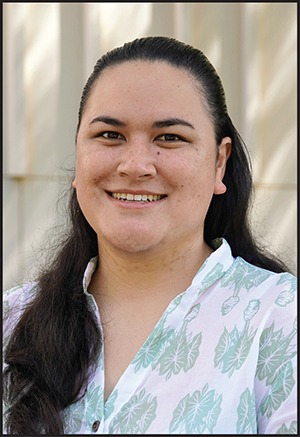Shavonn-Haevyn Matsuda | Movers & Shakers 2023—Advocates
In Shavonn-Haevyn Matsuda's MLISc program at the University of Hawai‘i at Mānoa, she focused on examining and challenging inadequacies of access in information systems and library services. Later, after becoming head librarian at the University of Hawai‘i Maui College Library, Matsuda’s doctoral research investigated creating a system of information for Hawaiian archives and librarianship.
 |
CURRENT POSITIONHead Librarian, University of Hawai‘i Maui College Library DEGREEMLISc, University of Hawai‘i at Mānoa, 2015; PhD Indigenous Studies, Te Whare Wānanga o Awanuiārangi, 2022 FOLLOWPhoto by Marc Antosch |
Respect for Lineage
For Shavonn-Haevyn Matsuda, her work as a librarian is intricately tied to Hawai’i. She believes that place informs community and community informs information-sharing customs. While studying for her MLISc and PhD in Indigenous Studies, Matsuda’s way through was with a community of kanaka (native Hawaiians) by her side, helping navigate the systemic barriers she encountered and unlocking her love for helping her community conduct research.
Matsuda grew up where every neighbor knew one another, and the closest supermarket was miles away. Neighbors operated from a space of giving without expectation and held a deep understanding of the importance of relationality. Living in and being a part of the community showed her how information was received and organized. Matsuda’s grasp of cultural practices regarding information is a knowledge base she is uniquely poised to bring to academic librarianship and archives.
In her MLISc program at the University of Hawai‘i at Mānoa, navigating inequity was no longer her sole goal; she focused on examining and challenging inadequacies of access in information systems and library services. Later, after becoming head librarian at the University of Hawai‘i Maui College Library, Matsuda’s doctoral research investigated creating a system of information for Hawaiian archives and librarianship.
The Hawaiian Knowledge Organization System is a continuation of her doctoral work. With funding from two grants, a controlled vocabulary that utilizes the Hawaiian language for cataloging metadata is being created. The goal is to normalize the use of the Hawaiian language and bring the community and language into the library.
The respect for lineage as authority directly impacts how information is organized and shared. For some, “You stand on the shoulders of those who came before you, but for us, we carry our ancestors,” Matsuda says. Co-creation of academic research rooted in community knowledge from ancestors is the foundation for designing an organization system that connects metadata with the way information lives in the community. And bridging the gap between archives and cultural practitioners enhances the real-life impact of information.
Matsuda hopes to “bring and represent my community in all the spaces I have the privilege to occupy,” noting how important it is to her to help create more pathways for kanaka to join this profession.
RELATED
ALREADY A SUBSCRIBER? LOG IN
We are currently offering this content for free. Sign up now to activate your personal profile, where you can save articles for future viewing










Add Comment :-
Comment Policy:
Comment should not be empty !!!